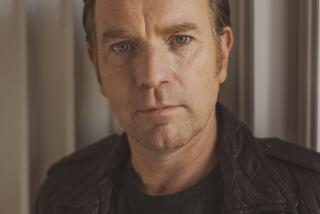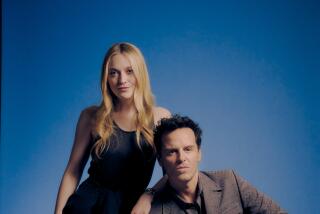MOVIE REVIEW : Talkin’ ‘bout Their Lost Generation
- Share via
Exuberant and pitiless, profane yet eloquent, flush with the ability to create laughter out of unspeakable situations, “Trainspotting” is a drop-dead look at a dead-end lifestyle that has all the strength of its considerable contradictions.
Set amid the junkies and thugs of Edinburgh’s slums and made by the same team (director Danny Boyle, writer John Hodge, producer Andrew Macdonald) that turned out “Shallow Grave,” “Trainspotting” caused a sensation in Britain, where it took in more money than any U.K. film except “Four Weddings and a Funeral” and ignited strong controversy over its attitude toward heroin.
But more than drugs, “Trainspotting’s” characters, who first appeared in an uncompromising novel by Irvine Welsh, are addicted to the rush of words. This is especially true of Mark Renton (Ewan McGregor), the film’s narrator, who unleashes an overpowering verbal torrent that gets things off to an aggressive, pulsating start.
“Choose life,” Renton insists in mocking voice-over as store detectives pursue him for shoplifting. “Choose a job. Choose a career. Choose a family. Choose a [expletive] big television, choose washing machines, cars, compact disc players and electrical tin openers. Choose good health, low cholesterol and dental insurance. Choose fixed-income mortgage repayments. Choose a starter home. Choose your friends. . . .
“But why would I want to do a thing like that? I chose not to choose life: I chose something else. And the reasons? There are no reasons. Who needs reasons when you’ve got heroin?”
Awash in attitude, this kind of “I’m not all right, Jack” nihilism struck a massive chord in Britain, where it tied into a national feeling of disconnection and uncertainty. Even without knowing the particulars, “Trainspotting” can’t be viewed over here without sensing its immediacy, its intoxicating sense of now.
What’s even more difficult is resisting the film’s terrific energy, how aggressively clever it manages to be. Though not interested in anything below the surface, “Trainspotting’s” vivid colors and inviting Britpop soundtrack (featuring groups such as Blur, Elastica and Primal Scream) create a vibrancy that resembles the blackest possible version of Richard Lester’s Beatles films.
Though “Trainspotting’s” style is all cheeky glibness, its subject matter is raw and raunchy, including AIDS, overdoses and unprovoked violence as well as obscene situations described in unprintable language. Truly this is a film that creates smiles out of things that can in no way be described as funny.
How is this possible? For one thing, despite its subject matter, “Trainspotting” is not particularly interested in being realistic, in turning out a socially conscious kitchen-sink drama. Playful surrealism is more to its taste, as witness the film’s signature scene, where Renton, in search of some lost opium suppositories, dives head-first into “the filthiest toilet in Scotland” and emerges in a sublime and spacious undersea world.
And despite Renton’s celebrated riff on the pleasures of heroin, boasting, “Take the best orgasm you ever had, multiply it by a thousand and you’re still nowhere near it,” “Trainspotting” is only interested in drugs because its characters are. Being true to its ruthless people, to Renton and his scabrous mates, showing what motivates them and why they’re drawn to drugs in the first place, is this film’s touchstone.
Most feeble of the lads is the glasses-wearing Spud (Ewen Bremner, Renton in the London stage version of the novel). Most devious is Sick Boy (Jonny Lee Miller, grandson of actor Bernard Lee, M in the James Bond films), who knows all there is to know about Sean Connery. Most innocent is Tommy (Kevin McKidd), whose insistence on telling the truth no matter what is viewed as a fatal weakness. And most dangerous is the beer-drinking, heroin-hating psychopath Begbie (a galvanic, thoroughly convincing performance by Robert Carlyle). Begbie, says Renton, “didn’t do drugs, he did people.” But he’s part of the group, and can’t be abandoned.
The first half of “Trainspotting” is episodic, as these ultimate rude boys and their acquaintances (including a scuzzy dealer named Mikey Forrester, played by author Welsh) are introduced and placed in their drug-obsessed element.
These sequences are the film’s funniest, and include Renton’s sudden passion for the mysterious Diane (Kelly Macdonald, discovered in an open casting call) and Tommy’s attempt to get the boys interested in the outdoors, which leads to Renton’s “I hate being Scottish” tirade, which memorably concludes: “Some people hate the English, but I don’t. They’re just wankers. We, on the other hand, are colonized by wankers. We can’t even pick a decent culture to be colonized by.”
No matter what Renton and his pals are up to, we stay interested because of these marvelous words, which won screenwriter Hodge the British Academy Award for best adapted screenplay, besting both “Sense and Sensibility” and “The Madness of King George.”
And though some of the words get lost in either local slang or thick Scottish accents, the script’s most memorable flights invariably go to Renton, devoid of regret or remorse, wised up to the nth degree. His delight in language nicely balances his ruthlessness, and in McGregor (who lost nearly 30 pounds to play the part and will soon be seen in the very different “Emma”) the film has an actor whose magnetism monopolizes our attention no matter what.
McGregor’s qualities are especially needed in the film’s second half, which is considerably darker and noticeably less interested in laughter than what’s come before. Welsh chose “Trainspotting” as the title for his novel to emphasize that heroin use is as futile an activity as writing down numbers of locomotives, and by the time this knowing film finishes, the aptness of that choice will not be in doubt.
* MPAA rating: R, for graphic heroin use and resulting depravity, strong language, sex, nudity and some violence. Times guidelines: extremely unsettling and meant to be.
‘Trainspotting’
Ewan McGregor: Renton
Ewen Bremner: Spud
Jonny Lee Miller: Sick Boy
Kevin McKidd: Tommy
Robert Carlyle: Begbie
Kelly Macdonald: Diane
Channel Four Films presents a Figment Film in association with the Noel Gay Motion Picture Co., released by Miramax Films. Director Danny Boyle. Producer Andrew Macdonald. Screenplay John Hodge, based on the novel by Irvine Welsh. Cinematographer Brian Tufano. Editor Masahiro Hirakubo. Costumes Rachel Fleming. Production design Kave Quinn. Art director Tracey Gallacher. Set dresser Penny Crawford. Running time: 1 hour, 34 minutes.
* At selected theaters throughout Southern California.
More to Read
Only good movies
Get the Indie Focus newsletter, Mark Olsen's weekly guide to the world of cinema.
You may occasionally receive promotional content from the Los Angeles Times.







